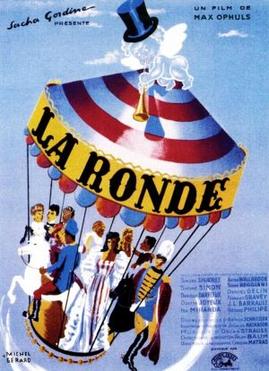Pages
▼
Tuesday, September 6, 2016
La Ronde (Max Ophuls, 1950)
Love supposedly makes the world go around, but in La Ronde it's sex that provides the spin. Ophuls and his fellow screenwriter, Jacques Natanson, put us in the hands of a narrator (Anton Walbrook) who facilitates the couplings of the various characters, beginning with a prostitute and a soldier, followed by the soldier's liaison with a chambermaid, her fling with the young man for whom she works, his with a married woman, and so on, until the merry-go-round (a literal presence on the screen) brings us back again to the prostitute. It's an ingenious business, first devised for the stage by the Viennese playwright Arthur Schnitzler in 1897 -- one reason why the film takes place in Vienna in 1900. At its best, La Ronde is a showcase for some lovely performances, including Walbrook's, but also those of Simone Signoret as the prostitute, Simone Simon as the chambermaid, Danielle Darrieux as the married woman, and, later in the circle dance, Jean-Louis Barrault as a pretentious poet. There are some witty moments: When one of the characters experiences erectile dysfunction, the merry-go-round breaks down and the narrator-facilitator is forced to repair it. In 1950, the movie taught American audiences who got a chance to see it what they were missing because of the hidebound Production Code. The Academy, whose members often chafed against the Code, honored it with two Oscar nominations: Ophuls and Natanson for their screenplay and Jean d'Eaubonne for art direction. Ophuls has a little fun with the censors, too, when one very close encounter is interrupted by the narrator seizing the film and cutting a section from it. Our age, haunted by various STD's, might take a darker view of the film's blithe copulation, which is why, I think, Ophuls's film seems a little hollow: too much style, not enough substance. Even in its day, La Ronde was little more than a charming anachronism, a fantasia about a world that never was, and if it had been, would have been swept away by two World Wars.
Charles Matthews
